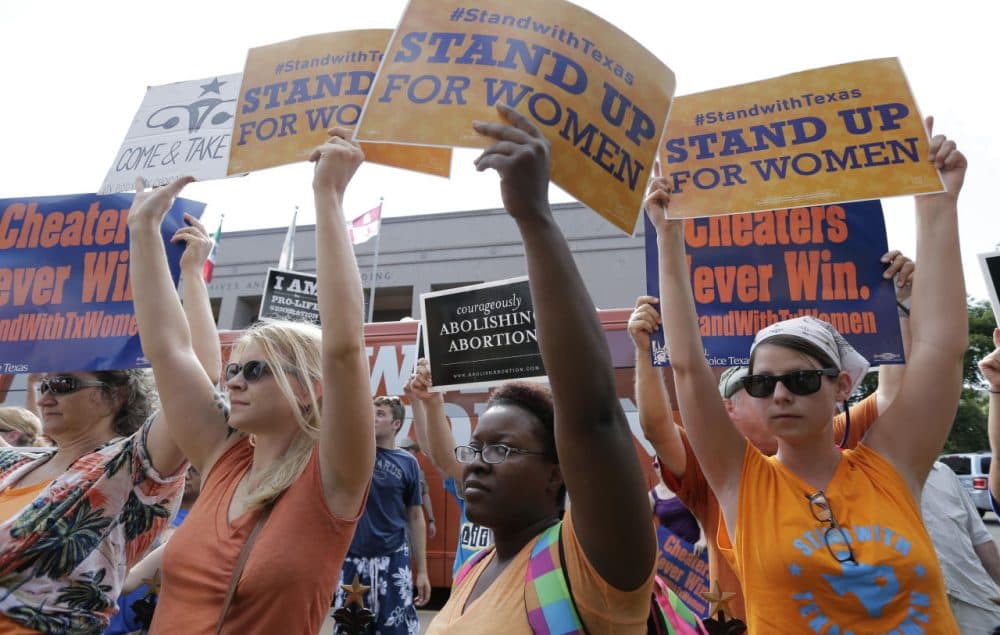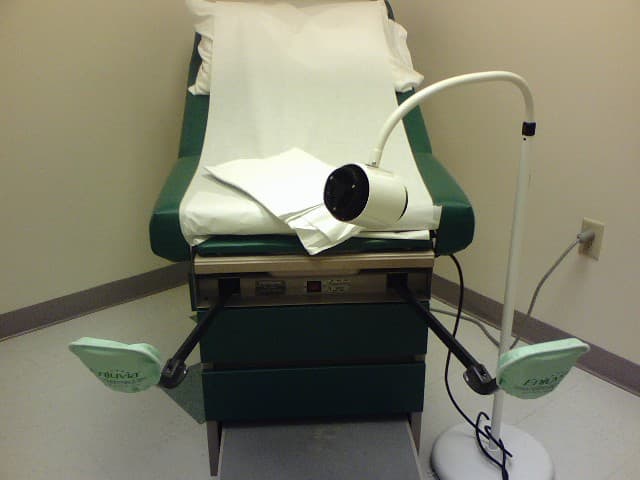Advertisement
Docs In Training Confide Their Feelings On Performing Abortions

Abortion can be hard for the patient. But it can also cause turmoil for the doctor performing the procedure.
Janet Singer, a nurse midwife on the faculty of Brown University's obstetrics-gynecology residency program, found herself acting as a confidant in many discussions with residents about abortion.
"Over the years, when a resident felt confused, overwhelmed or thrilled about something to do with abortion care, they often came to me to discuss it," she says.
Tricky questions continued to arise: Where does life actually begin? How do doctors' personal beliefs play out in their clinical care? And, what's really best for mothers?

Singer thought the general public would benefit from hearing more about the complexities of the young doctors' experiences. So she asked four residents to write about their feelings about abortion training and services, or as one resident characterized it: "one of the most life-changing interventions we can offer."
These personal stories are published in the July issue of the Journal of Obstetrics and Gynecology, headlined: "Four Residents' Narratives on Abortion Training: A Residency Climate of Reflection, Support, and Mutual Respect."
I asked Singer to offer a bit more background on the project, and here, edited, is her response, followed by some excerpts from the residents' narratives:
Janet Singer: The abortion debate in the U.S. is so divisive, making everything seem black and white; but the real life experiences of doctors and women are much more complex. I am a nurse midwife and though personally committed to increasing access to abortion services, I believe that abortion is not a black and white issue. I speak openly about my personal beliefs with the obstetric residents I work with.
My thinking about the grey areas surrounding abortion care are the result of many conversations with colleagues and residents. One came to me overwhelmed on a day when she had done a late-term abortion and then been called to an emergency C-section for a fetus/baby just a week further along.
She needed to talk about how overwhelming it felt to try to decide where the cusp of life was, why it was OK to take one fetus/baby out of the womb so it wouldn't live and one out so it might.
Following that conversation, a few of us decided to form a resident abortion providers support group so that the residents getting abortion training would have a safe space to talk about the complexity of abortion. At the same time, I started checking in, informally, with each resident during their abortion training block. I gave the resident an opportunity to talk — no agenda, no judgment, just a forum for exploring how they were feeling in their new role as abortion provider.
Advertisement
Some had little to say, but most were pondering big questions about what they were doing, why, how it affected them, how satisfied they felt. Conversations on this charged issue occur frequently among the residents. The residents who chose not to get abortion training also revealed the struggles they faced — feeling like they weren't offering comprehensive care to their patients or realizing they had to rely on colleagues to take care of this part of reproductive health care. And both groups had to confront the fact that the political rhetoric their side used just didn't fit the coworkers they loved and respected. The pro-choice group knew that their pro-life colleagues weren't "women haters." And the pro-life group knew their pro-choice colleagues weren't Hitlers. Each group was working from conscience, truly doing what they thoughtfully believed in.
I asked three residents — one committed to doing abortions, one who got training but was deeply conflicted about it, and one who had decided not to get training — if they would write about their experiences. We came up with a set of guiding questions and I told them not to censor, but just to spill. They poured their hearts out. The pro-life resident ended up doing one abortion — a late one because he understood the woman's plight and that the fetus was unlikely to survive.
After that, I decided we needed one more voice from someone who would never do an abortion, so we added a fourth resident.
The narratives revealed that the clear distinction between being pro-life and pro-choice often breaks down when one is faced with the real-life prospect of caring for pregnant women. (Though, as it happens, three of the four narratives are by men.) We hoped our writing would open a new dialogue about abortion, one that acknowledges the complexity of the issue.
Here are a few excerpts:
Resident 1:
When I started residency, I was open to the possibility of providing terminations. I was and remain uncertain about when life begins, and I used to hope that a deeper understanding of fetal development might help me make such a decision empirically. Over the course of internship, I came to understand embryonal development as a fluid yet constant march toward being human in which an embryo at 6 weeks is an entirely distinct entity from an anatomically formed fetus 2 months later. Unfortunately, this acquired knowledge has failed to help me fully define my position.
Increasingly, I have found myself caught up in an endless array of rhetorical questions. Is there not a more profound difference between 10 and 20 weeks than between 20 and 30? If my first task as a physician is to do no harm, how can I justify harming a fetus? I do not pretend to know the answers to these questions, but given what I perceived to be an abyss of ambiguity, I chose not to provide elective terminations. Our program director supported my choice, saying, “If anyone makes you feel uncomfortable about that choice, I need you to tell me right away.”
Discussions with co-residents have helped me consider the individual woman who has the courage to request an abortion. Since opting out, I have realized that my line of thinking has been feto-centric at best and over-intellectualized at worst. Nonetheless, in the absence of a clear moral understanding of abortion, I can only do no harm.
Resident 2:
At the start of residency, I was not sure if I was ready to perform elective terminations. I realized that the lion’s share of my reluctance was driven by “what would my mom think of me?” I struggled with my own faith, and with what God would think.
On my third-year obstetrics clerkship in medical school, I had my first experience with abortion in a patient with severe preeclampsia at 20 weeks of gestation. There was no provider in the city who felt adequately trained to perform an abortion at this gestational age, and I remember feeling helpless as we watched the patient get sicker. Twenty-four hours passed while a provider was flown in from out of state.
The woman’s clinical condition improved shortly after the procedure. When I was wavering about opting in for abortion training, I thought of this patient many times...One particular conversation with a senior resident was instrumental in my decision to participate in the abortion training. She explained that, for her, abortion is not “black and white”; it is not a “feel-good” procedure, but it changes the course of a patient’s life. It was so helpful to know that my apprehension was normal. That affirmation, along with my desire to gain gynecologic experience, gave me the confidence to pursue abortion training.
I was nervous about my first day at Planned Parenthood. I envisioned protesters chanting and throwing objects at me. After my first morning of early abortions, we performed an 18-week termination. Seeing the fetus on an ultrasound scan and then watching it as we did the procedure really shook me to the core. I thought maybe I had made the wrong choice, and I could not stop thinking about what my family would think if they knew what I had done.
Later that week we had an informal gathering of residents who had struggled with abortion training. It became apparent that others shared similar feelings. Many of us felt more comfortable with early abortions and struggled with second-trimester cases. Regardless of whether we performed abortions or not, it had to do with patient care and, in this case, our patients are the mothers. After listening to the struggles of fellow residents, I convinced myself to return to the clinic.
There, I soon realized how powerful it was to be able to comfort and assure such vulnerable patients. I began to frame my interventions at the clinic as life-changing for women.
Resident 3:
Although I might not always understand an individual woman’s choices, if she feels that she cannot be a parent for whatever reason, I will support her in that decision. I see little role for my personal values in the shared decision-making process.
The truth is that being involved in this work scares me. I am fearful of the violence and taunting that protesters have inflicted against providers. Assaulting providers in the name of “protecting life” disgusts me, especially because abortion is legal. This fear for my family and me has affected my interest in pursuing a family planning fellowship.
Abortion is a necessary procedure that I feel morally obligated to make available to my patients. The future of this service hinges on our society’s ability to support its practice, prevent undesired pregnancy, and ensure the safety of abortion providers. I have worked through my own internal struggles, but these broader societal issues will shape how I practice in the future. Participating in abortion services has left me fulfilled and honored, and I consider the provision of this care a privilege.
Resident 4:
I am a Born Again Christian, and I believe that life begins at conception. I believe that since I do not have the power to create life, I do not have the power to take it. I am proud of my choice and do not apologize for it, but that was not always the case.
I love obstetrics and gynecology — the breadth and depth, the bonds between patients and providers, and the lifelong relationships that are formed. However, I once heard someone say that an ob-gyn who did not provide terminations was not offering their patients the best, most complete care. Initially I shrugged this off as her opinion and deemed it irrelevant to me and to what my practice would become. But as I replayed that statement in my mind, I began to wonder, would I be providing the best care to my patients if offering terminations conflicted with my personal beliefs and passions? Would my patients feel judged and unsupported if I told them that I could not provide a service that they needed? Could I be truly impartial in my counseling?
